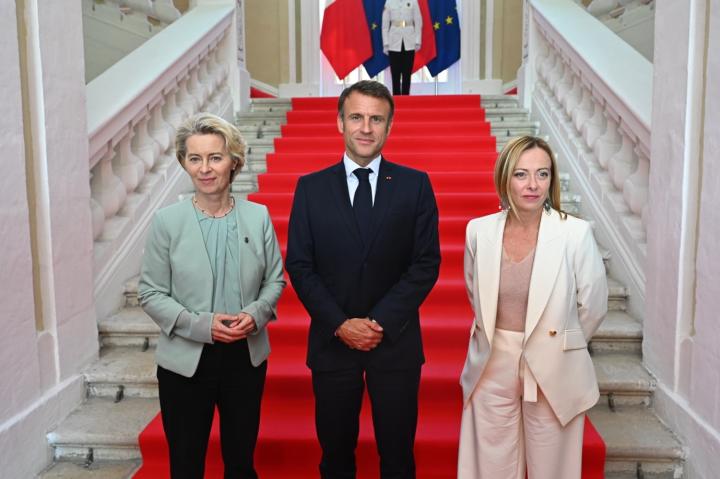European Elections 2024
The recent results of the European Parliament elections, held June 6-9, will significantly impact the political landscape across Europe. The much-heralded rise of right-wing politics has not had a major impact on the total number of seats in the European Parliament, but it has had a greater-than-predicted effect on national governments. The election results have prompted immediate political upheaval in France and provoked intense consternation in Germany and other countries. These results may lead to intensified civil unrest in multiple nations.

New European Parliament
In the European elections held last week, far-right parties have dominated the headlines as they made significant headway across the region. However, on the surface, it appears that the current coalition retains the majority in the European Parliament despite these gains made by the far-right. Of the 720 seats, the center-right European People’s Party (EPP) emerged as the single biggest group, followed by the Socialists and Democrats, and the centrist Renew Europe groups. The conservative, Eurosceptic European Conservatives and Reformists (ECR) and the far-right Identity and Democracy (ID) blocs together gained only 13 seats, which is fewer than predicted. However, some of the national parties that make up these further-right groups made significant gains within their own countries. The Greens were unable to repeat their 2019 “green wave”, losing 18 seats in the European Parliament.
National Impacts
At the national level, the elections have significantly impacted the political balance in France, Germany, and Italy. The votes may also affect the governments to a lesser extent in Austria, Belgium, Hungary, and Poland.
In France, the Rassemblement National (National Rally) party polled more than twice the number of votes as President Emmanuel Macron’s Renaissance party. In a surprise move, the president dissolved the National Assembly and called for snap elections to be held on June 30 and July 7. This is a high-risk strategy: the national election could prompt even further gains for the Rassemblement National, likely leading to a “cohabitation” of the centrist president with a far-right prime minister. Alternatively, the president may galvanize a center-left, centrist, and center-right coalition to reject the advance of the far-right. Macron’s high-risk strategy will almost certainly provoke demonstrations, strikes, and further security concerns in the run-up to the Paris 2024 Olympics starting July 26.
Belgium organized its general election on the same day as the European poll. The right-wing New Flemish Alliance (N-VA) beat the incumbent Open Flemish Liberals and Democrats. In Wallonia, the entrenched Socialist Party was beaten by the centrist Reformist Movement (MR). The prime minister resigned as is custom but will stay on as a caretaker until coalition talks are complete. The events prompted large-scale student and association-led left-wing demonstrations in recent days.
In Germany, Chancellor Olaf Scholz’s coalition of minority parties polled marginally ahead of the center-right Christian Democrat CDU/CSU alliance at around 30 percent each. However, advances made by the far-right Alternative fur Deutschland (AfD) led the party to 15 percent, ahead of Scholz’s own Social Democrats (SPD) party at 14 percent. This result undermines the ruling coalition nationally and poses challenges to governance going forward.
Italy’s prime minister, Georgia Meloni, is a major beneficiary of the elections. Meloni is the only leader among the larger EU countries to see her support increase. This result has consolidated the position of her Fratelli d’Italia (Brothers of Italy) nationally, and she will likely increase her personal influence, especially on energy and industrial policy at the European level.
The elections have also impacted many other countries. In Austria, the far-right Freedom Party (FPO) received the most votes, which is the first time that this party has led the polls. This result will almost certainly affect the run-up to the national elections to be held in late September. In Poland, Donald Tusk’s centrist coalition gained the majority of votes, but the narrow second place of the Law and Justice (PiS) party underlines the continued popularity of the populist party despite a series of scandals. In Hungary, Viktor Orban and the Fidesz party had their worst result in a European election, following a strong challenge by the former insider turned opponent Peter Magyar. This comes just weeks before the country assumes the rotational six-month EU presidency in July.
EU Implications
The overall balance of power in the European Parliament remains ostensibly similar to the 2019 session. However, the increased influence of far-right parties in Austria, France, Germany, and Italy will exacerbate existing tensions. The cordon sanitaire (the practice whereby mainstream parties avoid political alignment with the far-right) is expected to hold but is tenuous as the boundaries between far-right and center-right, and between extreme-right and far-right, become increasingly blurred. In the European Parliament, this will be manifest in the relations between the EPP, ECR, and ID blocs, and the selection of the next president of the EU Commission. A key element will be the balance between the more pro-NATO leaders, such as Meloni, and the more skeptical influence of Orban and Slovakia’s prime minister Robert Fico. This, in turn, will influence the ongoing EU support for Ukraine.
Security Implications
In recent days, the fallout from the European elections has prompted left-wing riots in Paris and demonstrations in Brussels. Forthcoming elections in France and Austria will likely prompt significant political rallies by both incumbent and opposition parties. Far-right political rallies are frequently met by counter-protests, increasing the likelihood of violence and rioting. Authorities will likely deploy significant additional security measures to any such demonstration event. France is particularly susceptible to strikes and protests, which may impact preparations for the Olympic Games.
The strengthening of the European Parliament’s conservative groups and the possibility of an increasingly far-right, Eurosceptic legislative agenda could lead to significant popular mobilization. Environmental groups will likely mobilize to protest any attempt to roll back climate regulations across the EU. Conversely, farmers’ groups will likely continue to protest across the region, both against increased environmental legislation and the trade deals with Ukraine on agricultural imports.
Author(s)
Vijey Ganesh
Learn More


